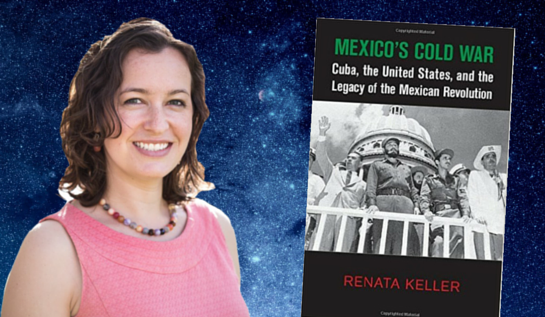Keller Publishes Book: Mexico’s Cold War
Renata Keller, Assistant Professor of International Relations at the Frederick S. Pardee School of Global Studies at Boston University, has published her first book, Mexico’s Cold War: Cuba, The United States and the Legacy of the Mexican Revolution from Cambridge University Press.
“I feel fantastic,” said Keller in an interview. “It’s so exciting to see it in book form. I’ve been working on this book for eight years.”
Mexico’s Cold War examines the history of the Cold War in Mexico and Mexico in the Cold War. Mexico did in fact suffer from the political and social turbulence that characterized the Cold War era in general, and by maintaining relations with Cuba it played a unique, and heretofore overlooked, role in the hemispheric Cold War.
The book was born when Keller, then a PhD student at the University of Texas, searched for a topic for her thesis.
“I came across an article on the website for the National Security Archives on connections between the revolutionary government in Cuba and Mexico. It made me realize that, while we normally think of Mexico and Cuba in relationship to the United States or in isolation, we don’t really look at them in relation to each other,” Keller said. “But the two countries had a hugely influential connection even before Castro, and after the Cuban revolution, Mexico was thrown off balance in ways that had never really been looked at before.”
Keller began her research in the Johnson Presidential Library on the University of Texas campus, but quickly realized she needed to go directly to the source.
“I went to Mexico in 2008, where I found thousands of recently-declassified intelligence reports,” Keller said. “Researching in Cuba was harder. The first time I traveled there, I couldn’t even get access to the foreign ministry archives, but in 2013 I was finally able to get in. It was fascinating. I read so much cool stuff no one had ever seen before – I found fan letters that Mexican citizens had written to Castro, I read about an incident when the Cuban government tried to get Mexico to turn over a CIA spy in the Mexican embassy. Great stuff.”
During a year-long fellowship at the Kluge Center at the Library of Congress, Keller focused on the writing of the book, switching from a thematic to a chronological approach. The book was published in England in July and is now available in hardcover in the United States.
“I am giving a talk on the book at the NYU Center for Cold War Studies this fall, and I will use sections to teach with in classes,” Keller said.
Keller’s next project is a hemispheric history of the Cuban Missile Crisis, specifically focusing on Latin American responses.
Keller has also received grants and fellowships from the Social Science Research Council, the Fulbright Foundation, and the Philanthropic Educational Organization. She has published her work in edited volumes and articles, including recent articles in Diplomatic History and the Latin American Research Review. Learn more about her here.
